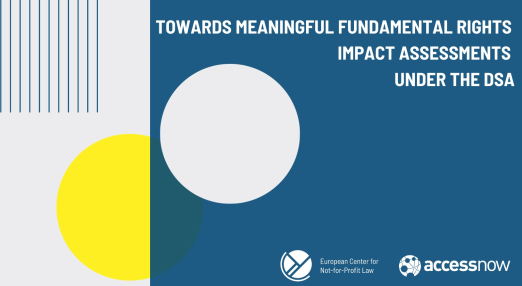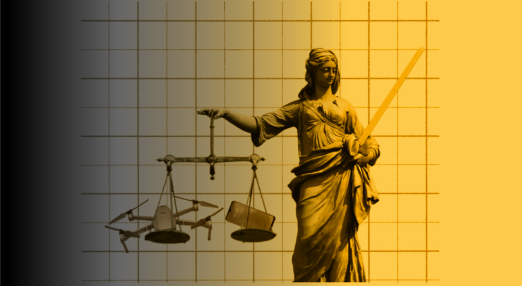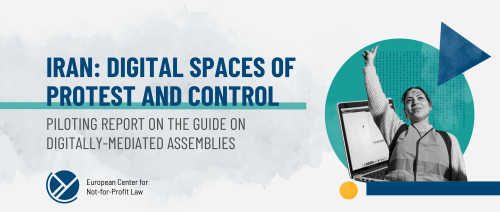ECNL
Filter by...
-

Packed with loopholes: Why the AI Act fails to protect civic space and the rule of law
The European Parliament approved the AI Act on 13 March 2024, thus marking the end of a three-year-long legislative process. Yet to come are guidelines and delegated acts to clarify the often vague requirements. In this article, ECNL takes stock of the extent to which fundamental rights, civic space and the rule of law will be safeguarded and provide an analysis of key AI Act provisions.
Read more
-

2023 Digital Rights Update: Eastern Partnership CSO Meter
Countries of the Eastern Partnership region continue digitalisation efforts and some implemented promising data protection legislation. However, the expansion of surveillance and spread of disinformation put digital rights under constant pressure in 2023.
Read more
-

How tech corporations like Google, Meta and Amazon should assess impacts on our rights
A new policy paper by EDRi members ECNL and Access Now outlines key recommendations on how to make fundamental rights impact assessments meaningful under the European Union's Digital Services Act (DSA).
Read more
-

Potential loopholes in the AI Act could allow use of intrusive tech on ‘national security’ grounds
Both the European Union (EU) and the Council of Europe (COE) negotiations are considering excluding AI systems designed, developed and used for military purposes, matters of national defence and national security from the scope of their final regulatory frameworks. If this indeed happens, we will have a huge regulatory gap regarding such systems.
Read more
-

Council of Europe must not water down their human rights standards in convention on AI
In a joint statement, civil society calls for a broad scope and definition of AI systems and no blanket exemptions for AI systems for national defence/national security.
Read more
-

Where artificial intelligence and climate action meet
The use of artificial intelligence (AI) has a major influence on climate action, climate change mitigation and the work of environmental defenders. It offers potential benefits, for example when it is used to enhance high-resolution mapping of deforestation, coral reef loss, and soil erosion. On the other hand, it poses a threat to the climate and its defenders when it leads to extraction of natural resources and when automated online surveillance is used to enhance the power of states and corporations to suppress climate activism and grassroots resistance.
Read more
-

Moving from empty buzzwords to real empowerment: a framework for enabling meaningful engagement of external stakeholders in AI
The use of artificial intelligence (AI) is accelerating. So is the need to ensure that AI systems are not only effective, but also fair, non-discriminatory, transparent, rights-based, accountable, and sustainable – in short, responsible
Read more
-

Mapping the impact of biometric surveillance and social media platforms on civic space
The European Center for Not-for-Profit Law is concerned about safeguarding human rights and limiting the negative impacts of security technology on civil society. Therefore, they launched a report with partners as a step to investigate how technologies introduced in the name of security and counter-terrorism will impact civil society.
Read more
-

Iran: Digital spaces of protest and control
European Center for Not-for-Profit law new report "Iran: Digital Spaces of Protest and Control" describes the impact of Iran's digital governance and censorship on digital assemblies.
Read more
-

Open Letter: The AI video surveillance measures in the Olympics Games 2024 law violate human rights
In an open letter, EDRi, ECNL, La Quadrature du Net, Amnesty International France and 34 civil society organisations call on the French Parliament to reject Article 7 of the proposed law on the 2024 Olympics and Paralympic Games.
Read more
-

New poll exposes public fears over the use of AI by governments in national security
EDRi’s affiliate European Center for Not-for-Profit Law (ECNL) commissioned a survey in 12 EU countries, where a representative sample of the public was asked about their opinion on the use of AI by governments. The poll has exposed public fears and shown stark differences with some of the positions taken by EU countries. Check out the results.
Read more
-

EU AI Act needs clear safeguards for AI systems for military and national security purposes
EDRi affiliate ECNL presents the second set of their proposals on exemptions and exclusions of AI used for military and national security purposes from the AIA, also endorsed by European Digital Rights (EDRi), Access Now, AlgorithmWatch, ARTICLE 19, Electronic Frontier Finland (EFFI), Electronic Privacy Information Center (EPIC) and Panoptykon Foundation.
Read more
